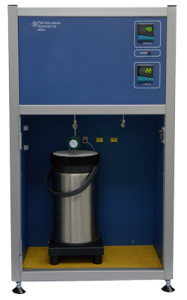AutoChem II 2920

AutoChem II 2920
Automated Catalyst Characterization System - A catalyst characterization laboratory enclosed in one cabinet.
The AutoChem II 2920 is a fully automated chemisorption analyzer that can provide your laboratory with the ability to conduct a comprehensive array of highly precise studies of chemical adsorption and temperature-programmed reactions. With this single instrument, you can acquire valuable information about the physical properties of your catalyst, catalyst support, or other materials. It can determine catalytic properties such as percent of metal dispersion, active metal surface area, acid strength, surface acidity, distribution of strength of active sites, BET surface area, and more. The AutoChem II 2920 performs pulse chemisorption,temperature-programmed reduction (TPR), desorption (TPD), oxidation (TPO), and reaction analyses and does it automatically.
This unit is also available in a Corrosion Resistant version.
Features
Wide Variety of Features and Benefits
Optimum design and efficient utilization of catalysts require a thorough understanding of the surface structure and surface chemistry of the catalytic material. Chemical adsorption (chemisorption) analyses can provide much of the information needed to evaluate catalyst materials in the design and production phases, as well as after a period of use. The chemical adsorption isotherm reveals information about the active surface of a material and has been employed for many years as a standard analytical tool for the evaluation of catalysts. In addition, temperature-programmed reaction techniques have emerged as an indispensable companion to chemisorption isotherm analyses in many areas of industry and research.
- Four internal temperature-controlled zones can be heated independently up to 150 °C. This prevents condensation in the flow path and allows studies to be performed with vapors.
- Low internal plumbing volume assures high resolution, fast detector response, and reduces error when calculating gas volumes.
- Highly sensitive linear thermal conductivity detector (TCD) assures the calibration volume remains constant over the full range of peak amplitudes so the area under the peak is directly proportional to the volume of gas reacted.
- Four high-precision mass flow controllers provide extremely accurate, programmable gas control. This assures a stable baseline and accurate determination of gas volumes.
- Corrosion-resistant detector filaments are compatible with most destructive gases and reduce the likelihood of filament oxidation.
- Clamshell furnace can heat the quartz sample reactor to 1100 °C. Any number of ramp rates and sequences facilitate customized experiments. The KwikCool feature cools the furnace temperature rapidly down to near ambient, reducing analysis time and increasing throughput.
- Four gas inlets each for the preparation, carrier, and loop gases permit four-gas sequential experiments, such as TPR/TPO cycles.
- Mass spectrometer port and software integration allows virtually simultaneous detection on both the thermal conductivity detector and mass spectrometer.
- Optional Vapor Generator permits analysis using vaporized liquids in an inert carrier stream.
- Optional CryoCooler enables the start of an analysis at sub-ambient temperature.
Hardware Advantages
The AutoChem II features stainless-steel construction, fully automated flow and pressure control, an embedded microprocessor with real-time control, and an intuitive graphical user interface for reactor control. A temperature-controlled, stainless-steel flow path provides an inert and stable operating environment, and reduces the potential for condensation in the flow path. The embedded microprocessor allows the AutoChem II to operate with real-time control; this provides enhanced stability by separating the AutoChem control from a PC or workstation.
- Twelve gas inlets (4 each for prep, carrier, and analysis) provide the capability to perform sequential experiments such as TPR/TPO cycle experiments.
- Equipped with four high-precision, independently calibrated mass flow controllers providing extremely accurate, programmable gas control. The ability to control gas flow with accuracy assures a stable baseline and accurate determination of gas volumes.
- Analysis gas may be introduced to the carrier stream by a precision automated loop. A calibrated, conveniently located septum is also provided through which analysis gas can be injected by means of a calibrated syringe.
- Thermal conductivity detector (TCD) is capable of detecting minute differences in the concentration of gases flowing into and out of the sample reactor. Its corrosion-resistant filaments are operated at constant temperature to prevent thermal runaway, which can destroy filaments in other systems.
- A clamshell furnace can heat the quartz sample reactor up to 1100 °C. The AutoChem II 2920 permits any number of ramp rates and sequences to facilitate customized experiments. The included KwikCool feature permits cooling the furnace temperature rapidly down to near ambient, reducing analysis time and increasing throughput. With the CryoCooler option, analysis temperatures can be ramped over the range of -100 °C to 1100 °C.
- Four internal temperature-controlled zones can be heated independently of each other to as much as 150 °C. This prevents condensation in the flow path and allows studies to be performed with vapors.
- The extremely low volume of the internal plumbing minimizes peak spreading and significantly enhances peak resolution. Furthermore, it reduces the time lag between the sample reactions and the corresponding detector
GSEM., JSC
Tel: +8424 62967539; Email: sales@gsemvn.com
Head Office: RM 630, 6th Floor, CIC Tower, 1 Nguyen Thi Due Str., Cau Giay Dist., Hanoi, Vietnam.
Registered Address: No. 18 Alley 313/6 Lane 313 Linh Nam, Hoang Mai, Hanoi











